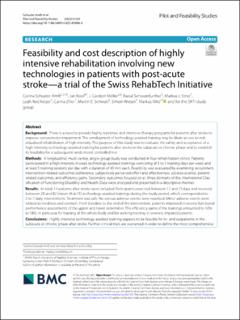Please use this identifier to cite or link to this item:
https://doi.org/10.21256/zhaw-25288| Publication type: | Article in scientific journal |
| Type of review: | Peer review (publication) |
| Title: | Feasibility and cost description of highly intensive rehabilitation involving new technologies in patients with post-acute stroke : a trial of the Swiss RehabTech Initiative |
| Authors: | Schuster-Amft, Corina Kool, Jan Möller, J. Carsten Schweinfurther, Raoul Ernst, Markus Reicherzer, Leah Ziller, Carina Schwab, Martin E. Wieser, Simon Wirz, Markus Menig, Alexandra Paredes, Liliana P. Rosemeier, Heike |
| et. al: | No |
| DOI: | 10.1186/s40814-022-01086-0 10.21256/zhaw-25288 |
| Published in: | Pilot and Feasibility Studies |
| Volume(Issue): | 8 |
| Issue: | 1 |
| Issue Date: | 2022 |
| Publisher / Ed. Institution: | BioMed Central |
| ISSN: | 2055-5784 |
| Language: | English |
| Subjects: | Stroke rehabilitation; Technology-assisted training; High intensity; Physical exertion |
| Subject (DDC): | 615.82: Physical therapy 616.8: Neurology, diseases of nervous system |
| Abstract: | Background: There is a need to provide highly repetitive and intensive therapy programs for patients after stroke to improve sensorimotor impairment. The employment of technology-assisted training may facilitate access to individualized rehabilitation of high intensity. The purpose of this study was to evaluate the safety and acceptance of a high-intensity technology-assisted training for patients after stroke in the subacute or chronic phase and to establish its feasibility for a subsequent randomized controlled trial. Methods: A longitudinal, multi-center, single-group study was conducted in four rehabilitation clinics. Patients participated in a high-intensity 4-week technology-assisted trainings consisting of 3 to 5 training days per week and at least 5 training sessions per day with a duration of 45min each. Feasibility was evaluated by examining recruitment, intervention-related outcomes (adherence, subjectively perceived efort and efectiveness, adverse events), patient related outcomes, and efciency gains. Secondary outcomes focused on all three domains of the International Classifcation of Functioning Disability and Health. Data were analyzed and presented in a descriptive manner. Results: In total, 14 patients after stroke were included. Participants exercised between 12 and 21days and received between 28 and 82 (mean 46±15) technology-assisted trainings during the study period, which corresponded to 2 to 7 daily interventions. Treatment was safe. No serious adverse events were reported. Minor adverse events were related to tiredness and exertion. From baseline to the end of the intervention, patients improved in several functional performance assessments of the upper and lower extremities. The efciency gains of the trainings amounted to 10% to 58%, in particular for training of the whole body and for walking training in severely impaired patients. Conclusions: Highly intensive technology-assisted training appears to be feasible for in- and outpatients in the subacute or chronic phase after stroke. Further clinical trials are warranted in order to define the most comprehensive approach to highly intensive technology-assisted training and to investigate its efficacy in patients with neurological disorders. |
| URI: | https://digitalcollection.zhaw.ch/handle/11475/25288 |
| Fulltext version: | Published version |
| License (according to publishing contract): | CC BY 4.0: Attribution 4.0 International |
| Departement: | School of Health Sciences |
| Organisational Unit: | Institute of Physiotherapy (IPT) |
| Published as part of the ZHAW project: | Machbarkeits-Studie zum Einsatz von Technologien in der Rehabilitation von Patienten mit chronischem Schlaganfall |
| Appears in collections: | Publikationen Gesundheit |
Files in This Item:
| File | Description | Size | Format | |
|---|---|---|---|---|
| 2022_Schuster-Amft-etal_Feasibility-cost-description-Swiss-RehabTech.pdf | 1.5 MB | Adobe PDF |  View/Open |
Show full item record
Schuster-Amft, C., Kool, J., Möller, J. C., Schweinfurther, R., Ernst, M., Reicherzer, L., Ziller, C., Schwab, M. E., Wieser, S., Wirz, M., Menig, A., Paredes, L. P., & Rosemeier, H. (2022). Feasibility and cost description of highly intensive rehabilitation involving new technologies in patients with post-acute stroke : a trial of the Swiss RehabTech Initiative. Pilot and Feasibility Studies, 8(1). https://doi.org/10.1186/s40814-022-01086-0
Schuster-Amft, C. et al. (2022) ‘Feasibility and cost description of highly intensive rehabilitation involving new technologies in patients with post-acute stroke : a trial of the Swiss RehabTech Initiative’, Pilot and Feasibility Studies, 8(1). Available at: https://doi.org/10.1186/s40814-022-01086-0.
C. Schuster-Amft et al., “Feasibility and cost description of highly intensive rehabilitation involving new technologies in patients with post-acute stroke : a trial of the Swiss RehabTech Initiative,” Pilot and Feasibility Studies, vol. 8, no. 1, 2022, doi: 10.1186/s40814-022-01086-0.
SCHUSTER-AMFT, Corina, Jan KOOL, J. Carsten MÖLLER, Raoul SCHWEINFURTHER, Markus ERNST, Leah REICHERZER, Carina ZILLER, Martin E. SCHWAB, Simon WIESER, Markus WIRZ, Alexandra MENIG, Liliana P. PAREDES und Heike ROSEMEIER, 2022. Feasibility and cost description of highly intensive rehabilitation involving new technologies in patients with post-acute stroke : a trial of the Swiss RehabTech Initiative. Pilot and Feasibility Studies. 2022. Bd. 8, Nr. 1. DOI 10.1186/s40814-022-01086-0
Schuster-Amft, Corina, Jan Kool, J. Carsten Möller, Raoul Schweinfurther, Markus Ernst, Leah Reicherzer, Carina Ziller, et al. 2022. “Feasibility and Cost Description of Highly Intensive Rehabilitation Involving New Technologies in Patients with Post-Acute Stroke : A Trial of the Swiss RehabTech Initiative.” Pilot and Feasibility Studies 8 (1). https://doi.org/10.1186/s40814-022-01086-0.
Schuster-Amft, Corina, et al. “Feasibility and Cost Description of Highly Intensive Rehabilitation Involving New Technologies in Patients with Post-Acute Stroke : A Trial of the Swiss RehabTech Initiative.” Pilot and Feasibility Studies, vol. 8, no. 1, 2022, https://doi.org/10.1186/s40814-022-01086-0.
Items in DSpace are protected by copyright, with all rights reserved, unless otherwise indicated.